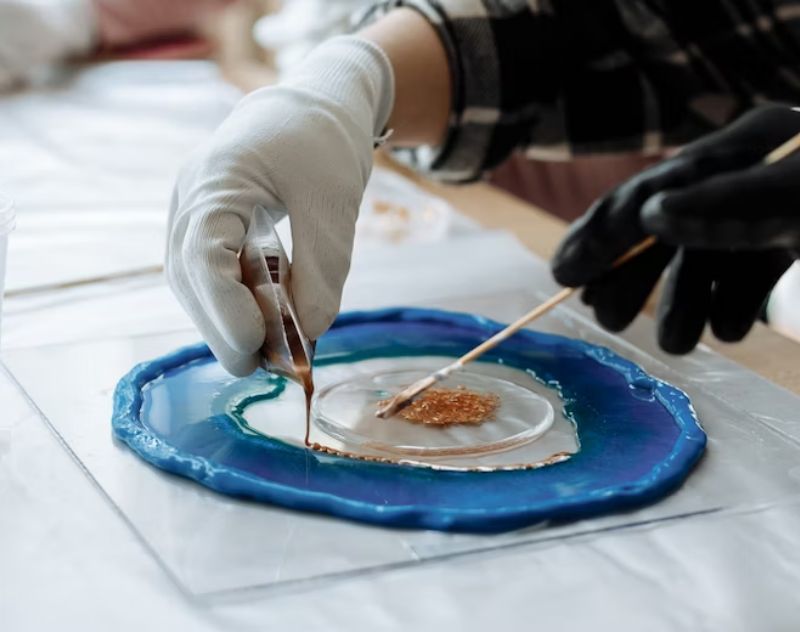Epoxy resin is a popular and adaptable medium for making beautiful jewellery, works of art, and other ornamental products. Knowing how to properly store and care for your epoxy resin starter set is crucial, whether you’re an experienced artist or just beginning your resin manufacturing journey. This guide will show you how to maintain the quality of your epoxy resin starter set supply.
Properly Storing The Epoxy Resin Starter Kit
To properly store your gallon of clear epoxy resin, the temperature should be between 15 and 24 degrees Celsius. Secondly, ensure that the pack is properly closed so as not to catch any moisture or impurities. Moreover, keep everything organized by properly labelling your projects and adopting a cleaner lifestyle in the workspace. Lastly, don’t spend too much on the stuff and rotate the inventory to keep the ingredients fresh and good to use.
Keep It Dry And Cool
Controlling the environment where your epoxy resin is stored is one of the most important considerations—changes in humidity and temperature impact epoxy resin’s performance. Store your resin in a dry, cool environment to preserve its quality. Aim for a temperature range of 60°F to 75°F (15°C to 24°C) with a relative humidity of under 50%.
Tightly Close All Containers.
The two components of epoxy resin are hardener and resin. Store these parts separately and in sealed containers to avoid contamination and guarantee the durability of your epoxy. For this purpose, resealable containers are typically included in epoxy resin kits. Before sealing the containers, clean the threads to avoid any uncured resin drying on them and jeopardizing the seal.
Label Each Item
Proper labelling is a quick and easy approach to prevent confusion and potential accidents when working with epoxy resin. Make sure to label your containers with the kind of resin or hardener they contain, the date of purchase, and any other important details.
Adopt A Clean Lifestyle
Keep your workspace tidy to preserve the quality of your epoxy resin starting kit. Always scrub down your work surface, stirring implements and mixing containers after using epoxy. Infecting your fresh batches with resin residue from surfaces or tools might cause curing problems.
Keep Cross-Contamination At Bay
Cross-contamination can produce unforeseen outcomes and wasteful outcomes. Use special tools and machinery for your epoxy resin applications to avoid this. Avoid using identical mixing cups, stir sticks, or silicone moulds for other craft projects to lessen the possibility of introducing unwanted substances or chemicals into your resin.

Separately Store Pigments And Additives.
Many resin artists add pigments, dyes, or additions to create distinctive colours and effects. Store these components separately from your epoxy resin and hardener to avoid unintentional contamination.
Keep pigments and additions in cool, dry areas and tight containers or bags. Remember that some of these products’ expiration dates may change as time passes.
Rotate Inventory And Look Up Expiration Dates
The potency of epoxy resin and hardeners might deteriorate with time. Utilize older materials first and buy new ones as needed to rotate your supply for the best results. Examine your epoxy items’ use-by or expiration dates, and discard any components past their prime.
Defend Against Debris And Dust
Your epoxy projects are readily contaminated by dust and dirt, which results in flaws or faults in the final product. Cover your crafts with a dust cover while they are cured to reduce this risk. To protect your work from flying debris, use a plastic container, a cardboard box, or a dust cover that has been expressly made for the purpose.
Properly Store Safety Equipment
Safety must always come first while handling epoxy resin. The safety equipment in your startup kit most likely comprises respirators, goggles, and gloves. Keep these things properly stored in a tidy, dry area, and inspect them occasionally for wear or damage. Replace any broken safety equipment to ensure your protection while working with epoxy.
Avoid Overbuying
While having adequate epoxy resin on hand for your projects is imperative, avoiding overstocking is as important. Epoxy resin can lose its effectiveness with time, especially if stored for a long time. To reduce waste and guarantee consistent results, only buy the resin and hardener you expect to use within a reasonable timeframe.
Conclusion
Gallon clear epoxy resin is a versatile medium for creating jewellery and ornamental products. Proper storage and care are crucial for long-term cost savings and consistent results. Store the resin in a dry, cool environment between 15-24 degrees Celsius, away from heat sources and direct sunlight. Close containers tightly to prevent contamination and ensure durability. Label each item and identify frequently used tools to prevent cross-contamination.
Frequently Ask Questions (FAQs)
How do you store epoxy resin?
Store epoxy in clean, dry areas with adequate ventilation.
How long can you store epoxy resin after opening?
Resin has a shelf life of 12 months from the date of manufacture. However, once the bottles have been opened, the shelf life remains only 6 months.
What conditions do you store epoxy resin?
Typical storage conditions for epoxy adhesives are 20-25°C (68-77°F) in a dry location.
How do you save epoxy resin for later?
Store in a cool, dark place, but use before 6 months as it will expire.

